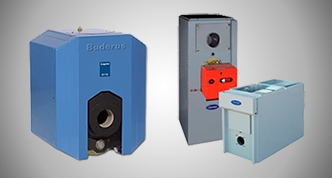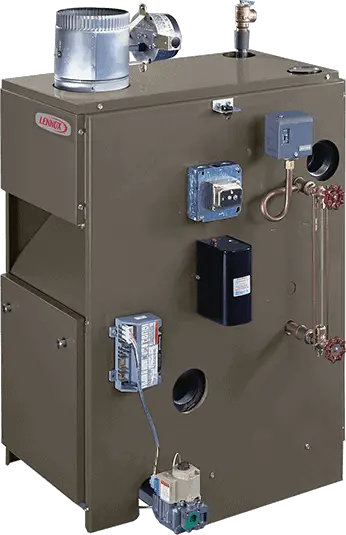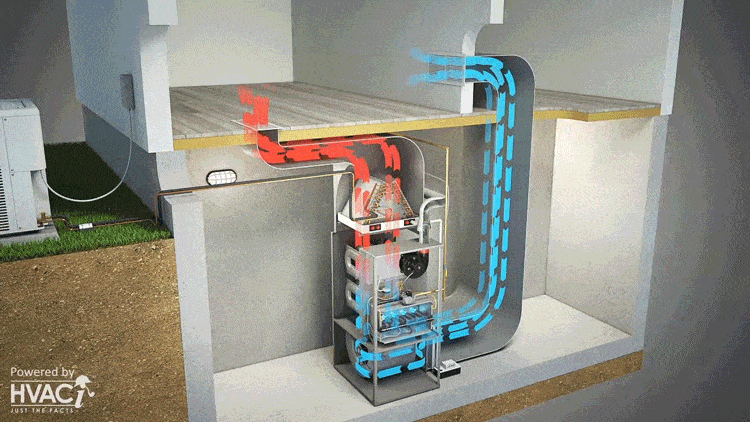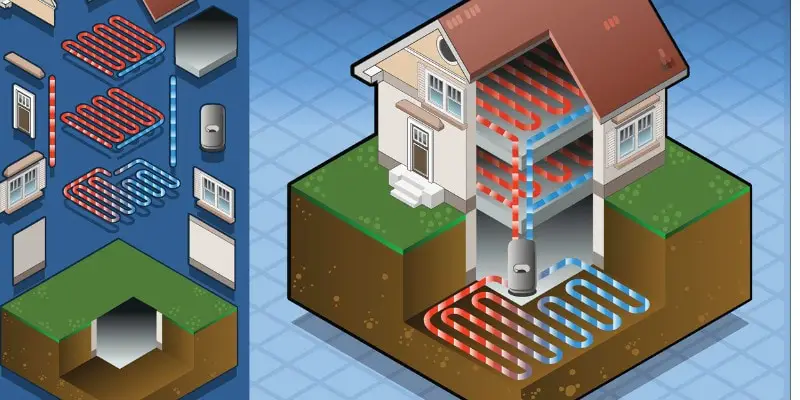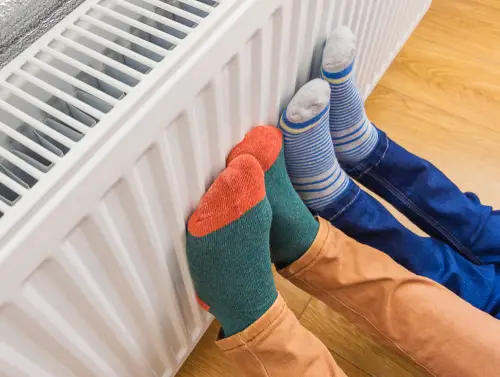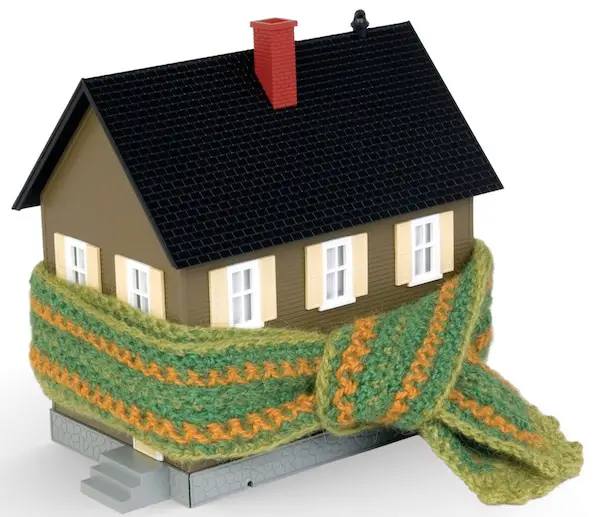Houses all across the US and many countries need efficient heating systems that do not put a dent in the user’s pocket. A huge range of heating systems are available, but the most commonly used heating systems for homes include boilers and furnaces.
This article looks at how these two compare to one another. As a result, you will be able to pick the unit that best matches your house’s needs.
We have also reviewed some of the best boilers and furnaces.
What is a Boiler and What Does a Boiler Do?
First, you need to understand how a boiler works and what its main purpose is. A boiler provides heat via water, in the form of either heated water or steam. It does this by consuming natural gas, burning, or electricity as well.
More advanced units now take up electricity as the power source. These units work by bringing water to extremely hot temperatures and then using radiation systems in the house’s flooring or radiation pipes to transfer heat throughout the home. Therefore, boilers provide radiant heat.
How to Size a Boiler
The ideal way to size a boiler is by understanding your house’s size and then matching it up to the unit’s capacity. The size of such units is measured in kilowatts of power output. So, the larger the house or, the greater the amount of heat required, the greater should be the kW rating. If you are likely to use the boiler for hot water as well as for heating the whole house, a larger unit will be required.
Ideally, for a three to four-bedroom house, a 30kW boiler will suffice. To calculate your boiler size, you need to determine the number of people/users in the house, house size/number of rooms, and the number of radiators. For regular boilers, 10-15 radiators need 20 to 26kW of a boiler size. For 20 or more radiators, 30 to 50kW is sufficient.
What is a Furnace and How Does a Furnace Work?
Compared to boilers that heat water, furnaces heat air. Like boilers, furnaces use electricity or natural gas to operate. Some units also use propane.
A furnace works alongside your house's air condition system and pushes heated up air through the ducts into your home. It uses a blower to push this heated air.
What Size Furnace Do I Need?
Furnaces are measured in terms of BTUs. So, to determine which BTU best matches your needs, you need to follow three steps.
First, you have to identify the kind of climate you are living in, as the harshness of winters in the area you live plays a huge factor in setting up the heating systems. So, for example, if you experience a Mediterranean climate, your BTU requirement will be 35 to 40. You can look up different BTUs for different climates easily.
Then, you need to measure the square footage area of your house. Finally, multiply the total square footage of your house with the required BTU of the climate you live in. This will give you the BTU output suitable for your home.
Boiler vs. Furnace Similarities and Differences
Even though the two systems have very similar core functions and purposes, there are some significant differences in and outside of the units that set them apart. This section takes a detailed look at some of their major differences and similarities.
How Are a Boiler and a Furnace Similar?
There are minor and insignificant similarities between the two units. However, because they have the same core purpose – to heat houses in conjunction with air conditioning systems – people often get confused between them. Here are a few similarities between the two:
Power Source
Both of these units can be run on multiple types of fuels and power sources. Common power sources that both these units can run on include electricity and natural gas.
Life Expectancy
They can last for about 10 to 15 years. This makes both a good choice since they have a good life expectancy.
What is the Difference Between a Boiler and a Furnace?
Here are some ways in which they are different:
Fuel
One major difference between the two is how they are powered. Furnaces can run on natural gas, electricity, and propane as well.
Meanwhile, boilers can be powered through traditional, more cost-effective means. They can run on wood pellets. However, this can give off more smoke and can be environmentally unfriendly.
Power Ratings
Both units are power-rated and measured in different terms. Furnaces have BTU ratings, while boilers are measured in terms of Kilowatts.
Blower
Furnaces use blowers to push hot air throughout the ducts of the house. Meanwhile, there is no blower present in a boiler, and it uses radiation pipes to transfer subtle heat.
Efficiency
The efficiency ratings on both units are different. Boilers are generally rated between 50 and 90% efficiency. Meanwhile, furnaces are more efficient and have a rating of about 59 to 99%.
Noise Levels
Since furnaces use blowers to push heated air, they tend to be louder and noisier than boilers.
Mode of Heat Distribution
The key difference between these two is how they work and produce heat. Boilers heat water to extreme temperatures so that it gives off steam as well. This hot water, as well as the steam, is run through radiation pipes and distributes heat.
Meanwhile, furnaces work with air only. They take in cool air, heat it up, and direct it towards the house via duct pipes and the help of blowers.
So, Boiler or Furnace, Which is Better?
As you must have understood, both these units provide the same function but with very different mechanisms. They require different sources of power, and they use this power entirely differently to generate the desired amount of heat. Some key aspects to consider here are their maintenance requirements, price point, and longevity. Interestingly, both furnaces and boilers can last up to a maximum of 20 years.
Meanwhile, it is also important to notice that furnaces are very high maintenance. They require costly maintenance and repairs more frequently than boilers. Hence, in the longer run, boilers will be more cost-efficient. Other factors, such as noise level, are also significant. If you have a small home and need your peace and quiet, a noisy heating unit is not the one for you. In such cases, boilers work better.
So, quiet, efficient, low-maintenance, and long-lasting boilers seem to have the lead here. However, it all comes down to your personal preferences, as well as external factors, such as budget, installation feasibility, house size, and climate.
How to Install a Boiler
Even though these units need to be installed by a professional, we have provided you with some tips and steps you can take to ensure a safe and sound installation.
- Before the installation, make sure that you have informed the local authorities of the area that a new boiler is being installed.
- The boiler will only be installed in an attic, loft, or in the kitchen where it is the least visible.
- You will need to make two holes from where the boiler will vent out the hot gas, while another hole will bring in cool air. The boiler cannot be connected to the old-style chimney, and therefore a hole will have to be made. This can be done via heavy-duty drills.
- Connect the two pipes, the in-going and out-going ones, with the venting holes through PVC pipes.
- Make sure to position the intake PVC connection (from the outside of the house) downward so that it can pull in dense, cold air. Position the venting PVC upwards so it can throw out warm air.
The video here will also give you a visual demo of how a boiler is installed. Use this video to get a better hold of the installation process.
How Do You Know When Your Boiler Needs Replacing?
There are some functionality and performance issues that appear repeatedly and tell you that the boiler needs replacement. We have listed down some important changes you can observe in your boiler to see if it needs replacement:
- Frequent breakdowns
- A sudden increase in utility/fuel costs and decrease in efficiency
- Unusual noises
- Flame is yellow
- Leaking water
How to Install a Furnace
Here is a brief guide on how to install a furnace.
- Firstly, make sure you have planned the positioning and location of your unit. Whether you have decided to place the air duct on the side or the bottom of the unit, a hole will have to be drilled in the unit.
- Once the unit has its own return air duct and you have decided its position, connect it to your home’s duct system.
- Connect the exhaust and intake pipes that come with your furnace
- Make sure the pipes are at a slope-like angle towards the furnace for a better flow of air.
- Connect the unit to your home’s gas or power supply.
- If your unit is electrical, it is recommended to confirm your wiring according to the instructional manual or have an electrician take a look at it.
- A hose will be installed on your unit that will act as a drainage pipe for the condensate residue.
- Run the unit for an hour as a trial, and make sure there are no irregular temperature spikes or weird smells and noises.
A detailed video is also attached here to further assist you in the installation.
How Long Should a Furnace Last?
A furnace requires lots of maintenance. A good-quality, properly installed, and maintained unit can last you somewhere between ten and twenty years.
Conclusion
Now that you have fully understood how furnaces and boilers work, you will be much more confident and informed while deciding for your home. Make sure to match the unit’s capabilities with your expected or preferred usage. Overpaying for an average unit should be avoided as high prices do not necessarily mean good quality.
People Also Ask
We have answered some important questions regarding the cost and expenses of boilers and furnaces above. Some other queries are also answered in this section to make it clear to you how the two units work and which one is better for you.
How Much Does it Cost to Switch From Boiler to Furnace?
A boiler can cost up to $8000. You will also have to pay the installation cost, which will be done by an HVAC expert. They can charge up to $100 to $200 per hour.
Do People Still Use Boilers?
Boilers give off very subtle and radiant heat, and they are energy-efficient. People think these units are outdated. However, advanced, modern units such as those with green-technology are still quite popular.
Can You Have Both a Furnace and a Boiler?
Yes, many homes use both furnaces and boilers. However, their functionality and purposes will vary in such cases. If you want to have both of these together, the furnace will be responsible for heating the house’s air, while the boiler will be used for providing hot water in washrooms and the kitchen.
Can a Plumber Install a Boiler?
Plumbers are not specifically qualified or certified to install boilers. However, they can do maintenance work and fix issues like leakages. A Gas Safe engineer is required to install a boiler properly.
How Much is a Furnace?
Any gas or electric furnace can cost between $2000 and $8000.
How Much is a Boiler?
A budget boiler can cost anywhere between $1800 and $2500. Meanwhile, higher-end models can cost from $7000 to up to $11000.

